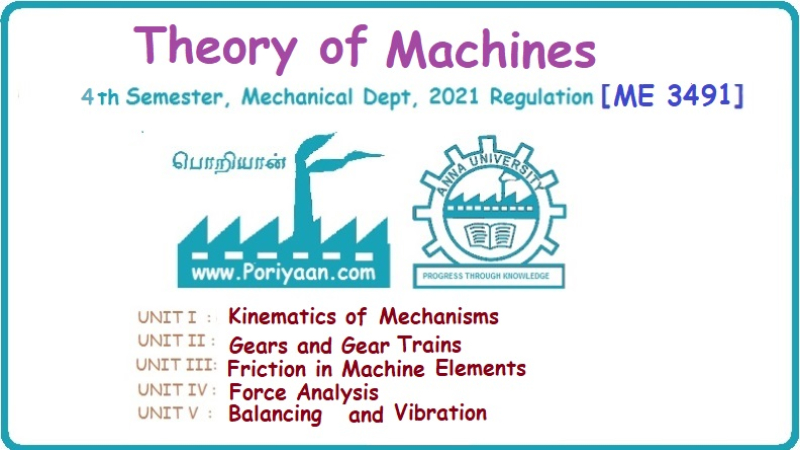Theory of Machines: Unit I: Kinematics of Mechanisms
Kinematics of Cam
Learning Objectives, Introduction
A cam is a rotating mechanical member used for transmitting desired motion to a follower by direct contact.
Chapter: 3
Kinematics of Cam
Learning Objectives
• While reading and after studying
this chapter, you will be able to:
• Classify the cam followers according
to their shape, location and motion.
• Understand and explain the various
terminologies used in the study of cam.
• Sketch and compare the displacement,
velocity and acceleration diagrams for uniform velocity, uniform acceleration
and retardation, simple harmonic motion and cycloidal motion, used in cam
mechanisms.
• Construct the displacement diagram
and the cam profile for the given follower motion.
• Construct the tangent cam and the
circular arc cam.
• Describe the effect of pressure angle
in a cam-follower system.
• Brief the phenomenon of undercutting
in cam mechanisms.
SYLLABUS
Classification of cams
and followers – Cam nomenclature – Displacement diagram - Derivatives of
follower motions - Layout of plate cam profiles – Circular arc and tangent
cams.
INTRODUCTION
• A cam is a rotating mechanical member
used for transmitting desired motion to a follower by direct contact.
• The cam may be reciprocating,
rotating or oscillating whereas the follower may be reciprocating or
oscillating.
• It is one of the most convenient
means of producing movements of an irregular or complex character not easily
obtained by linkages.
• The cam and follower have a line
contact and hence constitute a higher pair.
• Cam mechanisms are extensively used
in the operation of many classes of machines such as for operating valves in
internal combustion engines, in printing machinery, automatic screw machines,
gear cutting machines, stamp mills, paper cutting machines, spinning and
weaving textile machineries, etc.
• Cams are manufactured usually by
die-casting, milling or by punch-presses.
• The three necessary
elements of a cam mechanism are:
1. Cam:
The driving member is known as the cam.
2. Follower:
The driven member is known as the follower.
3. Frame:
It supports the cam and guides the follower.
Theory of Machines: Unit I: Kinematics of Mechanisms : Tag: : Learning Objectives, Introduction - Kinematics of Cam
Related Topics
Related Subjects
Theory of Machines
ME3491 4th semester Mechanical Dept | 2021 Regulation | 4th Semester Mechanical Dept 2021 Regulation
